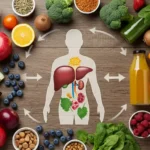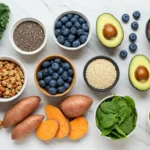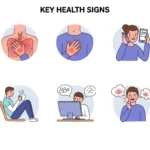Introduction
Lower blood pressure without relying on medication for maintaining a healthy lifestyle is crucial not only for overall heart health but also for finding effective natural remedies. In today’s world, where high blood pressure (hypertension) silently affects millions, it has become more important than ever to take charge of your health naturally.
This comprehensive guide reveals proven, evidence-based strategies to help you take control of your blood pressure using simple but powerful lifestyle changes. Let’s dive into how you can protect your heart and live longer naturally.
🩺 The Key to Better Heart Health and Lower Blood Pressure
Understanding the Connection Between Lifestyle and Blood Pressure
Your daily habits from what you eat to how much you sleep have a direct impact on your blood pressure levels. One of the most dangerous aspects of high blood pressure is that it often goes unnoticed. It’s frequently called the “silent killer” because many people have it for years without any symptoms, all while it causes damage to the arteries, heart, brain, and kidneys.
A healthy lifestyle, however, can be your first line of defense. According to the American Heart Association (AHA), even modest improvements in your diet and physical activity can lead to measurable reductions in both systolic and diastolic blood pressure. In fact, for some individuals, these improvements can be so effective that medication becomes unnecessary (AHA, 2023).
“Small lifestyle changes can yield large improvements in blood pressure, reducing long-term cardiovascular risks significantly,” — American Heart Association.
🥗 Natural Remedies and Diet Changes for a Healthy Lifestyle to Lower Blood Pressure

Improving your heart health doesn’t require drastic changes overnight. By incorporating proven natural remedies such as the DASH diet and nutrient-rich superfoods, you can effectively and sustainably lower blood pressure while promoting a truly healthy lifestyle.
🥦 Adopt the DASH Diet – A Natural Remedy for Heart Health
The DASH diet (Dietary Approaches to Stop Hypertension) remains one of the most respected and research-backed eating patterns for those looking to support their heart health through natural remedies. Designed to prevent and manage hypertension, the DASH diet emphasizes clean, whole-food nutrition while reducing known dietary triggers of high blood pressure.
🌱 Core Principles of the DASH Diet for a Healthy Lifestyle
- Eat plenty of fruits, vegetables, whole grains, legumes, and lean proteins.
- Reduce sodium, saturated fats, red meat, and added sugars.
- Focus on nutrients like potassium, magnesium, calcium, and fiber, all of which are essential for cardiovascular function.
According to the National Heart, Lung, and Blood Institute, the DASH diet can lower systolic blood pressure by up to 11 mmHg, making it a highly effective strategy for individuals seeking natural remedies for hypertension (NHLBI, 2023).
❌ What to Avoid to Support Lower Blood Pressure
To enhance the effects of the DASH approach, it’s crucial to minimize the intake of:
- Processed foods (e.g., frozen meals, canned soups)
- Sugary beverages like soda and energy drinks
- Excessive caffeine, which may spike blood pressure temporarily
- High-sodium condiments such as soy sauce, ketchup, and salad dressings
💡 Pro Tip for Heart Health
Start slowly by reducing your sodium intake to under 1,500 mg per day. Gradual changes are more sustainable and easier to adopt over time, especially when using herbs, lemon, and spices to flavor your meals.
🍫 Add These Heart-Healthy Superfoods to Your Diet
In addition to following the DASH diet, certain superfoods have been scientifically linked to lower blood pressure and improved vascular health. These nutrient-dense foods offer natural, non-pharmaceutical benefits when added to your daily meals.
🥬 Leafy Greens
Spinach, kale, and swiss chard are loaded with potassium, which helps your kidneys flush excess sodium from your system — a key factor in controlling blood pressure.
🍠 Beets
Beets and beet juice contain nitrates, which are converted into nitric oxide in the body. This compound helps relax and widen blood vessels, reducing resistance and lowering blood pressure.
🌾 Oats
Rich in beta-glucan, a type of soluble fiber, oats have been shown to reduce both systolic and diastolic pressure when consumed regularly.
🧄 Garlic
Garlic contains allicin, a sulfur compound known to promote vasodilation, or the widening of blood vessels.
🍫 Dark Chocolate (70% or more cocoa)
In moderation, dark chocolate supports vascular function thanks to its flavonoid content, which improves endothelial health and blood flow.
✅ Final Insight
Incorporating both the DASH diet and targeted superfoods is a powerful and enjoyable way to take control of your blood pressure. These dietary choices are not only practical and sustainable but also backed by extensive research as effective natural remedies for enhancing your heart health. Remember, small steps lead to significant progress and every healthy bite counts.
🧘 Mindfulness and Stress Reduction to Lower Blood Pressure

Chronic stress can quietly sabotage your heart health. When your body stays in a constant state of tension, it releases excess cortisol a hormone directly linked to increased blood pressure. That’s why incorporating natural remedies like stress reduction and mindfulness into your lifestyle is essential if your goal is to lower blood pressure without relying solely on medication.
By embracing techniques like deep breathing, meditation, and proper sleep hygiene, you support both your mental and cardiovascular well-being. These strategies are not only easy to implement, but they’re also backed by scientific research as effective tools for managing hypertension.
🧘♀️ Practice Deep Breathing and Meditation for Heart Health
Among the most powerful natural remedies for stress-related high blood pressure are mindfulness-based practices. Techniques such as meditation, progressive muscle relaxation, and controlled breathing activate the parasympathetic nervous system, calming your body and helping regulate blood pressure.
💨 Try the 4-7-8 Breathing Technique
This simple yet powerful breathing pattern is used to quickly induce a relaxation response:
- Inhale deeply for 4 seconds
- Hold your breath for 7 seconds
- Exhale slowly for 8 seconds
Repeating this cycle four times before bed or during stressful moments helps reduce anxiety and lower blood pressure.
📱 Mindfulness Apps to Support a Healthy Lifestyle
If you’re new to meditation, consider using an app to guide your practice. Popular choices include:
- Calm: Guided meditations, breathing exercises, and sleep stories
- Headspace: Mindfulness programs for stress, anxiety, and sleep
- Insight Timer: Free meditations, music, and courses from global teachers
Integrating these tools into your daily routine can gradually reshape how your body responds to stress, supporting a healthier lifestyle and improved heart health over time.
😴 Prioritize Sleep Hygiene to Naturally Lower Blood Pressure
When it comes to natural remedies, sleep is one of the most underrated factors. Poor or insufficient sleep contributes significantly to elevated blood pressure, insulin resistance, and cortisol spikes. Fortunately, adopting healthy sleep habits is one of the simplest ways to improve your cardiovascular health.
💤 Essential Tips for Healthy Sleep and Heart Health
- Aim for 7–9 hours of restful sleep every night
- Keep a consistent schedule by waking and sleeping at the same time daily
- Avoid screens (phones, TVs, tablets) at least 1 hour before bedtime to reduce blue light exposure
- Maintain a cool, dark, and quiet bedroom environment to optimize melatonin production
- Consider magnesium supplements to promote relaxation but always consult your doctor before beginning any supplement
By making sleep a top priority, you’re not just enhancing your mood or productivity you’re directly influencing your ability to lower blood pressure and protect long-term heart health.
✅ Final Insight
Implementing stress-reduction strategies like deep breathing, meditation, and healthy sleep hygiene can be life-changing. These natural remedies don’t just relax your mind they actively contribute to lower blood pressure and enhanced heart health. Start small, be consistent, and you’ll soon notice the profound benefits that a mindful and well-rested life can bring.”
🚶 Physical Activity Is A Natural Way to Lower Blood Pressure

When it comes to protecting your heart health and reducing hypertension naturally, physical activity plays a vital role. You don’t need to train like an athlete or join an expensive gym. Instead, moderate, consistent exercise can serve as one of the most powerful natural remedies to lower blood pressure and promote a healthy lifestyle.
Exercise acts as a natural vasodilator, which means it helps blood vessels relax and widen, improving circulation and reducing the workload on your heart. The great news? These benefits begin to accumulate even with light to moderate movement no marathon required.
💓 Exercise as a Natural Vasodilator to Support Heart Health
Cardiovascular exercise often referred to as aerobic activity directly strengthens the heart, helping it pump more efficiently. This enhanced performance leads to lower pressure on the arteries and better circulation overall.
🔄 How Physical Activity Helps Lower Blood Pressure Naturally
- Enhances blood vessel flexibility
- Improves oxygen delivery throughout the body
- Helps the body eliminate excess sodium and fluid
- Reduces stress hormones like cortisol and adrenaline
According to the 2017 ACC/AHA Hypertension Guidelines, aerobic exercise can lower blood pressure as effectively as some medications in certain individuals. “Aerobic exercise lowers blood pressure as effectively as medication in some adults,” says Dr. Paul Whelton, lead author of the guidelines.
🏃 Recommended Weekly Exercise for Heart Health
- 150 minutes of moderate-intensity aerobic activity per week
- Can be broken into 30 minutes a day, 5 times per week
- No need for intensity consistency is key!
🏅 Easy and Accessible Examples
- Brisk walking in your neighborhood or local park
- Cycling on a stationary or outdoor bike
- Swimming or even water aerobics
- Dancing to your favorite playlist in the living room
These options are not only enjoyable but also sustainable, making it easier to maintain a healthy lifestyle long-term.
💪 Strength Training and Flexibility for Long-Term Heart Health
While cardio gets most of the attention, strength training and flexibility exercises also contribute significantly to overall heart health. Muscle mass plays a role in metabolic health, while stretching helps maintain healthy circulation and reduce tension throughout the body.
🏋️ Incorporate Resistance Training
- Aim for 2–3 sessions per week
- Focus on major muscle groups: legs, back, chest, and arms
- Use bodyweight, resistance bands, or light weights if you’re a beginner
🧘 Add Flexibility and Mobility Workouts
- Daily stretching routines help reduce arterial stiffness
- Activities like yoga or tai chi are excellent for combining breath control, flexibility, and mental calmness
- Improved circulation and posture can indirectly support lower blood pressure
Together, aerobic and resistance exercises create a powerful strategy for naturally managing blood pressure. And perhaps most importantly, they contribute to a stronger, more energetic, and healthier lifestyle overall.
✅ Final Insight
When combined with good nutrition and mindfulness, physical activity becomes one of the most effective and accessible natural remedies to lower blood pressure. Whether you’re walking the dog, dancing to music, or lifting light weights, each movement strengthens your heart and supports your long-term heart health. The most important step is the first one so lace up your shoes and move toward a healthy lifestyle today.
🍵 Herbal and Natural Remedies: Supplements to Lower Blood Pressure and Support Heart Health
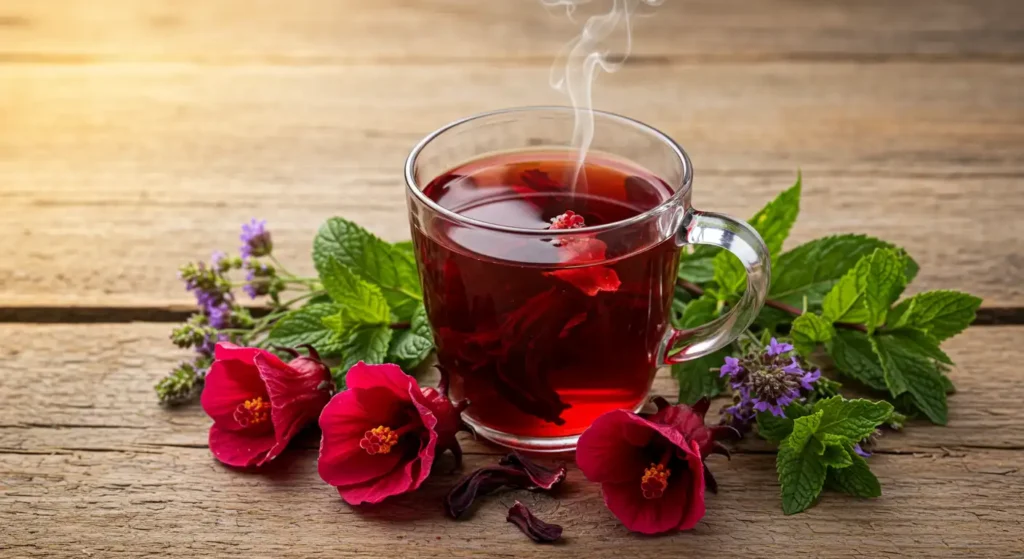
Embracing a healthy lifestyle often includes turning to natural remedies that support the body’s internal balance. For individuals aiming to lower blood pressure without relying entirely on pharmaceuticals, herbal and natural supplements offer a compelling path backed by both tradition and science.
Plants and nutrients have long been used in various cultures to promote heart health, and modern research continues to confirm their effectiveness. However, it’s essential to approach supplements with knowledge and caution. While many options can naturally aid in reducing hypertension, they are most effective when paired with dietary changes, exercise, and mindfulness.
🌿 Top Herbal and Natural Remedies to Lower Blood Pressure
Certain herbs and nutrients can significantly support blood pressure regulation. Below are some of the most widely studied and promising natural supplements you can incorporate into your healthy lifestyle always with guidance from your healthcare provider.
🌺 Hibiscus Tea: A Potent Natural Blood Pressure Aid
Hibiscus tea, made from the deep red calyces of the Hibiscus sabdariffa plant, is one of the most powerful natural remedies for hypertension. It contains anthocyanins and other antioxidants that act as natural vasodilators, relaxing blood vessels and improving circulation.
A study published in The Journal of Nutrition (2008) found that adults who consumed hibiscus tea daily saw an average 7.2 mmHg reduction in systolic blood pressure over six weeks (McKay et al., 2008).
Drink 1–2 cups daily for gentle, ongoing support hot or cold, it’s both refreshing and healing.
🐟 Omega-3 Fatty Acids: Essential for Heart Health
Omega-3s are vital fats found in:
- Flaxseeds
- Chia seeds
- Walnuts
- Fatty fish (like salmon or mackerel)
- Fish oil supplements
These fatty acids help reduce inflammation, lower triglyceride levels, and improve arterial function all contributing to lower blood pressure. Studies have shown that daily intake of omega-3 supplements can result in modest but meaningful reductions in both systolic and diastolic pressure.
💊 Coenzyme Q10 (CoQ10): A Cellular Antioxidant for the Heart
CoQ10 is a naturally occurring antioxidant in the body that assists in cellular energy production especially in the heart. Supplementing with CoQ10 has shown promise in lowering systolic blood pressure in individuals with hypertension, likely due to its role in improving blood vessel elasticity.
🧂 Magnesium: The Electrolyte that Promotes Relaxation
Magnesium helps regulate more than 300 enzyme systems in the body and is especially important for vascular tone. It relaxes the muscles in blood vessel walls, which can lead to a noticeable decrease in blood pressure.
Natural sources include:
- Leafy greens (spinach, kale)
- Pumpkin seeds
- Almonds
- Whole grains
Magnesium supplements may also be recommended for those who are deficient, but dosage should be discussed with your doctor.
⚠️ Important Note About Natural Supplements and Lifestyle Safety
While these natural remedies offer many benefits, it’s important to remember:
- Not all supplements are created equal quality matters.
- Herbal remedies may interact with prescription medications.
- Always consult a licensed healthcare provider before starting any supplement routine.
Combining these herbal solutions with physical activity, proper nutrition, and stress reduction can help you build a sustainable, healthy lifestyle while effectively managing heart health.
✅ Final Thought
By incorporating herbal teas, omega-3s, and targeted nutrients like magnesium and CoQ10 into your routine, you’re taking proactive steps to improve your heart health and lower blood pressure naturally. These supplements are powerful tools especially when combined with a healthy lifestyle rooted in whole foods, movement, and mindfulness.
🚭 Habits to Break: What to Avoid for Better Heart Health and to Naturally Lower Blood Pressure
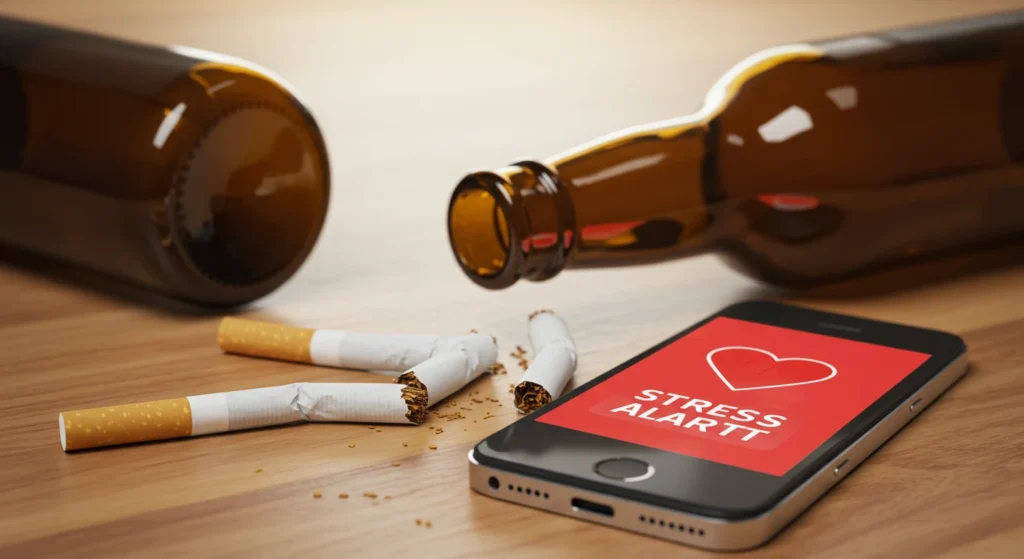
Adopting a healthy lifestyle isn’t just about what you include in your routine it’s equally important to consider what needs to be avoided. Certain common habits can silently harm your cardiovascular health, raising blood pressure over time. By recognizing and breaking these behaviors, you strengthen your efforts to lower blood pressure naturally, without relying solely on medications.
Over the years, numerous studies have confirmed that risk factors such as smoking, excessive alcohol consumption, chronic stress, and caffeine overload are directly linked to hypertension. The good news is that these are areas where you can actively intervene, shaping a sustainable path to a longer and healthier life.
🚬 Say Goodbye to Smoking and Excessive Alcohol for a Healthier Heart
Smoking: A Direct Threat to Heart Health
Smoking affects your blood pressure almost immediately. Nicotine causes temporary narrowing of blood vessels, forcing the heart to work harder to pump blood. Over time, this constant strain can lead to chronically elevated blood pressure and irreversible artery damage.
According to the American Heart Association, quitting smoking can reduce the risk of heart disease by up to 50% after just one year of abstinence (AHA, 2023).
Quitting smoking is undoubtedly one of the most effective decisions for improving your heart health and increasing your life expectancy.
🍷 Alcohol: Limit, Don’t Eliminate But Be Mindful
While some studies suggest that alcohol in moderate amounts may have neutral or mildly beneficial effects, excess alcohol is an enemy of stable blood pressure. Alcohol negatively affects blood vessels, increases fluid retention, and interferes with antihypertensive medications.
Moderate consumption recommendations:
- Women: Up to 1 drink per day
- Men: Up to 2 drinks per day
Opting for alcohol-free days and choosing low-alcohol beverages are effective strategies for maintaining cardiovascular health in check.
☕ Avoid High-Stress Triggers and Caffeine Overload
Chronic Stress: A Silent Contributor to High Blood Pressure
Although stress is a natural part of life, constant exposure to negative stimuli such as alarming news, excessive work, or personal conflicts — can continuously activate the sympathetic nervous system, raising cortisol levels. This, in turn, contributes to elevated blood pressure and chronic inflammation.
Practical tips:
- Limit screen time, especially before bed
- Avoid consuming negative news first thing in the morning
- Prioritize relaxing activities like gardening, reading, or meditation
Caffeine: Know Your Limits
While caffeine offers benefits such as increased mental alertness and better physical performance, it can cause temporary spikes in blood pressure — especially in sensitive individuals or those already suffering from hypertension.
Foods and drinks to monitor:
- Strong coffee (above 200 mg per serving)
- Energy drinks
- Excessive black or green tea
- Pre-workout supplements
If you notice rapid heartbeats, anxiety, or insomnia after consuming caffeine, consider reducing your intake or opting for decaffeinated versions.
✅ Summary: Breaking Toxic Habits Is Part of a Healthy Lifestyle
Building a healthy lifestyle and maintaining healthy blood pressure requires conscious effort. By breaking harmful habits such as smoking, excessive alcohol consumption, chronic stress, and uncontrolled caffeine intake, you take a crucial step in protecting your heart and improving your long-term quality of life. Remember: sustainable changes start with small daily decisions.
📊 Track Progress and Stay Consistent with Your Healthy Lifestyle to Lower Blood Pressure

Adopting a healthy lifestyle to manage your blood pressure naturally is a powerful decision but to ensure long-term success, consistency and tracking are essential. Knowing where you stand and how far you’ve come helps keep your motivation high and gives you the insight needed to fine-tune your natural remedies and routines for optimal heart health.
Many people struggle with staying on track, especially when progress is gradual. However, even small changes, when measured and acknowledged, can have a major impact. Let’s explore the best ways to monitor your journey and celebrate your efforts while reducing the risk of hypertension-related complications.
🩺 Use a Blood Pressure Monitor at Home for Reliable Tracking
One of the most effective tools for maintaining healthy blood pressure is a personal blood pressure monitor. Tracking your readings regularly not only gives you real-time feedback on your progress but also reinforces accountability.
According to the Mayo Clinic, self-monitoring can help detect patterns and assess how your daily activities like diet, sleep, and stress affect your blood pressure levels (Mayo Clinic, 2023). This empowers you to make smarter choices based on actual results.
Best Practices for At-Home Monitoring:
- Measure twice daily: Once in the morning before eating and once in the evening before bed.
- Rest 5 minutes beforehand and sit with your back supported and feet flat on the floor.
- Avoid caffeine, exercise, and smoking for 30 minutes prior to measuring.
- Use a validated, automatic monitor with a cuff that fits your upper arm properly.
Bonus Tip:
Keep a blood pressure journal or use a health-tracking app to log your readings. This allows you to visualize trends over weeks and months, which can be very motivating especially when you begin to see consistent improvements.
🎉 Celebrate Small Wins and Focus on Progress
When working toward lower blood pressure, it’s easy to become discouraged if results don’t come overnight. But remember: even small victories have big health payoffs.
Research shows that just a 5 mmHg reduction in systolic blood pressure can reduce your risk of stroke by about 14% and heart disease by up to 9% (Whelton et al., Hypertension, 2017).
So rather than chasing perfection, celebrate steady progress:
- Did you choose a low-sodium meal instead of fast food? That’s a win.
- Completed your third walk this week? Another win.
- Managed stress instead of reaching for caffeine? You’re on the right track.
Positive reinforcement builds motivation. Reward yourself (in healthy ways) like enjoying a relaxing activity, buying a new book, or simply recognizing your discipline and commitment.
💡 Final Thought: Progress Is Personal
Every individual’s journey toward better heart health is unique. Whether your numbers improve slowly or more rapidly, staying consistent with your healthy lifestyle choices including diet, exercise, stress management, and natural remedies will lead to meaningful and lasting results. Trust the process, and don’t forget to reflect on how far you’ve already come.
💡 Conclusion: You Can Lower Blood Pressure Naturally and Reclaim Your Heart Health
Making small yet powerful changes in your healthy lifestyle can dramatically improve your heart health and help you lower blood pressure no pills required. From dietary shifts to mindfulness and exercise, the steps are simple, sustainable, and scientifically supported.


